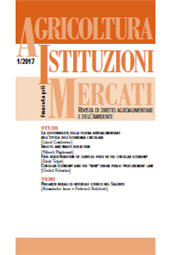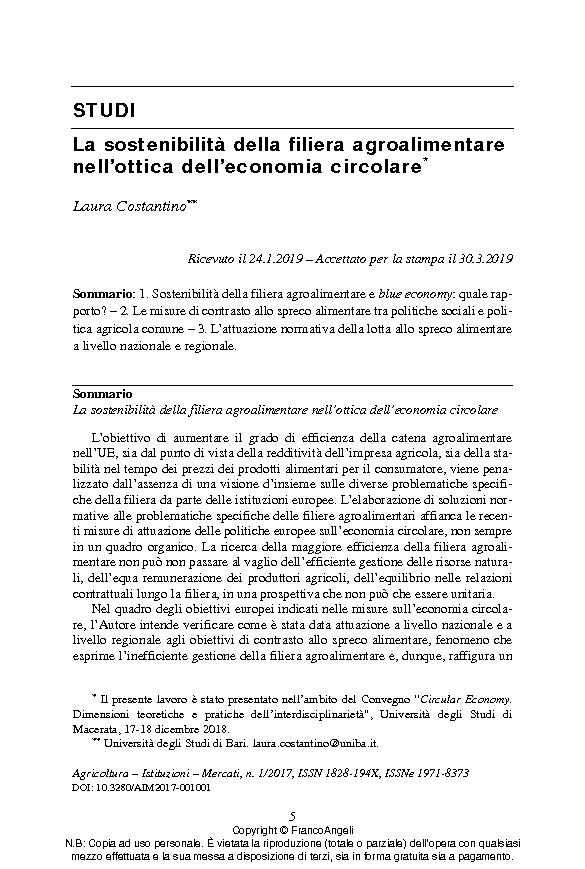La sostenibilità della filiera agroalimentare nell'ottica dell'economia circolare
5-16 p.
L'obiettivo di aumentare il grado di efficienza della catena agroalimentare nell'UE, sia dal punto di vista della redditività dell'impresa agricola, sia della stabilità nel tempo dei prezzi dei prodotti alimentari per il consumatore, viene penalizzato dall'assenza di una visione d'insieme sulle diverse problematiche specifiche della filiera da parte delle istituzioni europee. L'elaborazione di soluzioni normative alle problematiche specifiche delle filiere agroalimentari affianca le recenti misure di attuazione delle politiche europee sull'economia circolare, non sempre in un quadro organico. La ricerca della maggiore efficienza della filiera agroalimentare non può non passare al vaglio dell'efficiente gestione delle risorse naturali, dell'equa remunerazione dei produttori agricoli, dell'equilibrio nelle relazioni contrattuali lungo la filiera, in una prospettiva che non può che essere unitaria.
Nel quadro degli obiettivi europei indicati nelle misure sull'economia circolare, l'Autore intende verificare come è stata data attuazione a livello nazionale e a livello regionale agli obiettivi di contrasto allo spreco alimentare, fenomeno che esprime l'inefficiente gestione della filiera agroalimentare e, dunque, raffigura un interessante campo di sperimentazione per l'attuazione di misure applicative del modello di economia circolare. [Testo dell'editore]
The aim of increasing the efficiency of the agri-food chain in the EU, both from the point of view of the profitability of the agricultural enterprises and of the stability of food prices for the consumer over time, is penalized by the absence of a systematic approach on the different problems specific to the supply chain by the European institutions. The development of regulatory solutions to the specific problems of the agri-food supply chains joins the recent measures for implementing European policies on the circular economy, not always within an organic framework. The search for greater efficiency in the agri-food chain cannot fail to examine the efficient management of natural resources, the fair remuneration of agricultural producers, the balance in contractual relations along the supply chain, in a perspective that can only be unitary.
In the framework of the European objectives indicated in the measures on the circular economy, the Author intends to verify how the national and regional provisions have been implemented to regulate food losses and waste, a phenomenon that undoubtedly represents the inefficient management of the agri-food chain and therefore represents an interesting field to verify the application measures of the circular economy model. [Publisher's text]
Fait partie de
Agricoltura, istituzioni, mercati : rivista di diritto agroalimentare e dell'ambiente : 1, 2017-
Articles du même numéro (disponibles individuellement)
-
-
Informations
Code DOI : 10.3280/AIM2017-001001
ISSN: 1971-8373
KEYWORDS
- Sostenibilità della filiera agroalimentare, economia circolare, spreco alimentare
- Sustanibility of agri-food chain, circular economy, food loss, food waste



